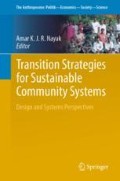Abstract
This chapter provides a background to the various dimensions of sustainability that we understand as the critical pillars of sustainability for any community system. Based on these five key dimensions, the contributions in this book have been categorised into five broad sections. This chapter discusses these five critical dimensions – relationships, institutions, production, organisation and governance – from design and systems perspectives for the sustainability of any community system. Under each dimension, critical factors are presented as a spectrum; where characteristics of each factor at one end of the spectrum tend to create locking-in effects, control by a few, inequity and unsustainability in the long run, while at the other end characteristics of the same factors facilitate equity, freedom and sustainability. With reference to characteristic of each factor, the chapter inherently argues that design for sustainability needs to be anchored on the natural principles of interconnections and interdependence.
Discussions in the chapter uncover that although sustainability appears to be fuzzy, blurred and impossible; making our communities and society sustainable is within our collective choices in the way we choose the direction of each of these factors under the five critical dimensions. Figures 1.1 and 1.2 of this chapter summarise the critical dimensions and the spectrum of each of the twenty-five factors. In the final analysis, this chapter implies that if people in small communities and various external stakeholders, including government officials, development and corporate executives, recognise the current design flaws and simultaneously make efforts to unlock themselves from the various lock-in effects, our transition to sustainability will be easily achievable.
Amar K. J. R. Nayak, Professor of Strategic Management, Xavier Institute of Management, Xavier University Bhubaneswar, Odisha, India; Email: amar@ximb.ac.in
Access this chapter
Tax calculation will be finalised at checkout
Purchases are for personal use only
References
Nayak, A.K.J.R., 2009: “Optimizing Asymmetries for sustainability: design issues of producer organizations”, XIMB Sustainability Seminar Series, Working Paper 1.0, January, Bhubaneswar.
Nayak, A.K.J.R., 2011: “Efficiency, effectiveness and sustainability: the basis of competition and cooperation”, XIMB Sustainability Seminar Series, Working Paper 3.0, January, Bhubaneswar.
Nayak, A.K.J.R., 2014: “Logic, language and values of co-operation versus competition in the context of recreating sustainable community systems”, in: International Review of Sociology, 24(1): 13–26.
Nayak, A.K.J.R., 2017: National Conference on Transistion Strategies for Sustainable Community Systems (Bhubaneswar: XIM Bhubaneswar).
Nayak, A.K.J.R., 2018: “Economies of scope: context of agriculture, smallholder farmers, and sustainability”, in: Asian Journal of German and European Studies, 3:2, https://doi.org/10.1186/s40856-018-0024-y.
Piketty, Thomas, 2014. Capital: In the Twenty First Century (Cambridge, Mass: Harvard University Press).
Rousseau, J.J., 1762: The Social Contract.
Schumacher, E.F., 1973: A Study of Economics as if People Mattered (London: Bonde and Briggs).
Schumpeter, J.A., 1943: Capitalism, Socialism and Democracy (London: Routledge).
Shah, T., 1996: Catalysing Co-operation: Design of Self-governing Organizations (New Delhi: Sage).
Vernon, R., 1971: Sovereignty at Bay: The Multinationals Spread of US Enterprises (New York: Basic Books).
Vernon, R., 1977: Storm Over the Multinationals: The Real Issue (London: Macmillan).
Vernon, R., 2009: In Hurricane’s Eye: The Troubled Prospects of Multinational Enterprises (Cambridge, MA: Harvard University Press).
Author information
Authors and Affiliations
Corresponding author
Editor information
Editors and Affiliations
Rights and permissions
Copyright information
© 2019 Springer Nature Switzerland AG
About this chapter
Cite this chapter
Nayak, A.K.J.R. (2019). Introduction: Transition Challenges and Pathways to Sustainable Community Systems: Design and Systems Perspectives. In: Nayak, A. (eds) Transition Strategies for Sustainable Community Systems. The Anthropocene: Politik—Economics—Society—Science, vol 26. Springer, Cham. https://doi.org/10.1007/978-3-030-00356-2_1
Download citation
DOI: https://doi.org/10.1007/978-3-030-00356-2_1
Published:
Publisher Name: Springer, Cham
Print ISBN: 978-3-030-00355-5
Online ISBN: 978-3-030-00356-2
eBook Packages: Earth and Environmental ScienceEarth and Environmental Science (R0)

